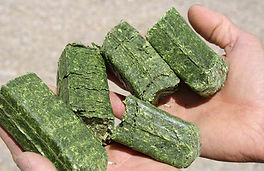

Common Questions
Alfalfa hay cubes are made of chopped alfalfa compressed into cube form. The hay is cut into windrows and allowed to sun cure. After it is perfectly cured, the alfalfa is picked up and chopped by a forage harvester. The chopped alfalfa is then transported to a stationary cuber where it will be compressed into approximately a 1.25 inch cube.
For more information on cubes and how they are made, click the Process link above.

More Consistent Nutrient Content
Alfalfa hay cubes tend to contain a more consistent content of nutrients than baled hay. At James Farm, our alfalfa is grown biologically to maintain a perfect balance of nutrients to save you supplemental feed costs.
You'll see in the chart that the levels for primary nutrients are nearly identical.
Nutrient comparison of alfalfa hay and alfalfa cubes on a dry matter basis.

Values for alfalfa hay were taken from Nutrient Requirements of Horses (1999), published by the National Research Council. Values for alfalfa cubes were provided by Equi-analytical Laboratories (www.equi-analytical.com), and data represent the average for over 300 analyzed samples.
Hay Cubes require less space.
Because cubes are so much more dense than baled hay, they are a great alternative for horse owners with limited amount of storage space. Roughly 3 - 50 pound bags of hay cubes will fit in the same amount of space used by a 50 pound bale of hay.

Saves Transportation costs.
Cubes are transported in van-type trailers. Transportation is less expensive because vans work on a lower rate than flat beds.
Easier to transport.
Alfalfa hay cubes also require much less space in a horse trailer. Hay cubes may also be an easier alternative to take to competitions and shows. Hay cubes are also much easier to bring along on trail rides.

Less Feed Waste
When horses are fed long stem hay, they have the ability to pick through the hay. In this process, many of the stems are pushed out of the feeder and wasted. Cubes are entirely consumed by the horse. This assures that your horse gets all the nutrients and fiber possible. Your horse will consume 10-15% less cubes than long stem by weight.
Easier to Monitor and Regulate
A horse owner can easily keep an eye on how much their horse is consuming on a daily basis. Feed amounts are easily regulated and measured.
Less Dust
Alfalfa hay cubes contain and produce a very small amount of dust. If you have a horse with respiratory problems, hay cubes can be a great alternative. Less exposure to organic dust helps horses to avoid airway inflammation and breathing difficulties.

At James Farm we believe that the best quality hay begins with healthy soil. Years of experience and learning have brought us to our current methods of biological farming. Biological farming is working with the life processes in the soil. We test our soils and plant tissue to assure the proper balance of nutrients. Our main fertilizer is compost which builds healthy soil. Raising healthier hay has enabled us to cut our pesticide use to a minimum.
The lush and healthy hay we grow makes a top quality balanced feed, which means you dont need to use feed supplements. Most horses on our cubes will require less pounds of feed per day than usual. We use the minimum amount of bentonite needed to make a consistently palatable cube.

